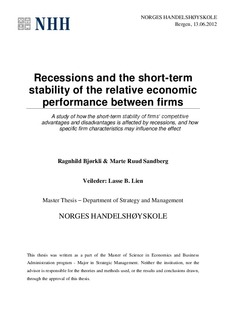| dc.description.abstract | The purpose of this study is to analyze how recessions affect the relative economic performance between firms by measuring the short-term stability of Norwegian firms’ competitive advantages and disadvantages during the financial crisis of 2008. Further, analyses will be conducted to determine whether specific firm characteristics affect the changes in their short-term stability. Financial data on Norwegian firms for the period 1999-2010 was analyzed in order to investigate these issues. Our results show that i) the financial crisis of 2008 had considerable negative impact on the aggregate firm performance of Norwegian firms, and the effect was more severe for poorly performing firms than for well performing firms, ii) firms’ competitive advantages were less stable in crisis, and more stable in booms, and iii) different firm characteristics like size, leverage and growth affected the effect of the crisis on the short-term stability of firms’ competitive advantages. Finally, we give some directions for future studies. | no_NO |
